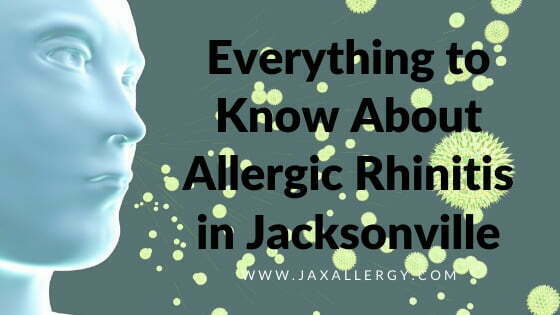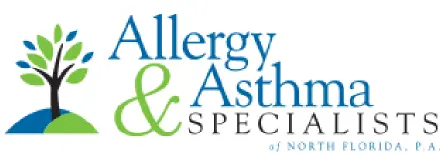Everything You Need to Know About Allergic Rhinitis in Jacksonville

We recently talked about dealing with pollen allergies here in Jacksonville and we’re well into hay fever season. Many of our patients suffer from allergic rhinitis triggered by seasonal allergens.
With that being said, here is some helpful information about allergic rhinitis, for our Jacksonville, Orange Park and St. Johns patients.
What is Allergic Rhinitis (Hay Fever)?
Allergic rhinitis — what most people commonly call “hay fever” — is a set of symptoms that people experience when they breathe in any airborne substance of which they are allergic. The majority of the symptoms affect the nose, but can also affect the eyes, upper respiratory tract and lungs.
Pollen from trees, grasses and weeds is very high in the Jacksonville. These pollens, unlike other colder climates, are present in the air most of the year. However, spring allergies are often worse in susceptible individuals with tree pollen allergy since the levels are so high between February and May. Year-round allergic rhinitis sufferers may also have allergies due to dust mite, animal dander and mold.
An interesting fact is that hay fever has nothing to do with hay nor does it cause fever. The name stuck because symptoms would strike during hay-harvesting season and the symptoms became associated with hay.
What are the Risk Factors?
So who is at risk for allergic rhinitis? A major risk factor is if you have family members who already have allergic rhinitis, or who suffer from eczema or asthma. Allergic rhinitis is also more prevalent in people who already suffer from food allergies or have asthma or eczema themselves.
What are common Allergic Rhinitis Symptoms?
There are some characteristic symptoms of allergic rhinitis. Most symptoms are physical responses to allergens, but there are behavioral characteristics as well.
The most persistent symptoms are excessive nasal secretions or a runny nose and post-nasal drip. Nasal congestion is common. Itchy, red, swollen eyes and dark rings around the eyes (“allergic shiners”) come with hay fever, as does coughing, sneezing, and sore throat.
While these symptoms are frustrating, it may be helpful to remember what your body is doing: an allergen is invading your body and your body is mounting a defense to get rid of the irritant. Sneezing, coughing, and a runny nose all help to get rid of whatever is bothering you.
A common behavioral symptom is the “allergic salute.” To relieve irritation and drainage of mucus from the nose, an allergy sufferer will instinctively and habitually wipe their nose in an upward motion with the palm of their hand. This action clears mucus from the nose and temporarily opens the nasal passages allowing for clearer breathing. Unfortunately it also helps the spread of germs and doesn’t offer real relief. Disrupted sleep and fatigue may also be secondary to allergic rhinitis.
What are the treatment options for Hay Fever sufferers?
The most effective treatment for hay fever is to avoid what ails you but we realize that isn’t always an option especially with pollen allergens. For this reason there are a numerous treatment options available.
For our patients who suffer from allergic rhinitis in Jacksonville, we customize a personal allergy treatment based on your medical history and lifestyle needs. Not everyone has allergies and each allergic individual has their own specific allergy profile, similar to a fingerprint. Therefore, the first step in proper treatment is to determine your specific allergen responses by performing skin testing to regional allergens. We can then discuss specific allergen control measures depending on your sensitivities. Next we can prescribe a variety of treatment options using either medications or immunotherapy (allergy shots).
Environmental Control Measures
Once a patient’s specific allergens are identified, we are able to discuss measures to minimize exposure to the culprit allergens. While this may be difficult depending on the allergen, it is an essential and non-invasive component of allergy care.
Medication Treatments
These treatments could include prescription or over-the-counter recommendations such as corticosteroids (nasal sprays), as well as antihistamines, decongestants, or leukotriene modifiers (for example, Singulair), nasal saline irrigations and other therapies. Each of these medications work differently and may have different side effects. Therefore it is important for an allergist to tailor medical therapy to your symptoms and allergens.
Immunotherapy
If you are one of our patients who do not respond positively to medication or would rather not take medications another option for treatment may be immunotherapy or allergy shots. This method provides injections of small amounts of allergen, over the course of weeks to years, with the goal of making your body’s immune system less sensitive to allergens. With this form of treatment it may be possible to eliminate the symptoms of allergic rhinitis.
We are in the heart of hay fever season here in Jacksonville. If you are suffering and need relief, call 904-730-4870 or contact us to schedule an appointment at one of the four Allergy and Asthma Specialists of North Florida locations around Jacksonville – including in Orange Park on Kingsley Ave., Mandarin area on San Jose Blvd., or on the Northside on Dunn Ave..
